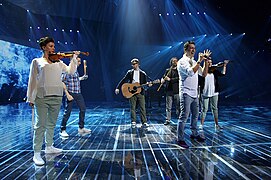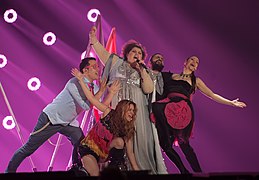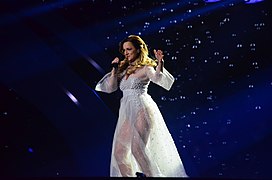Serbia at the Eurovision Song Contest
- Broadcasting company

- First participation
- 2007
- Number of participations
- 12 (as of 2019)
- Highest ranking
- 1 ( 2007 )
- Highest Score
- 298 ( 2007 SF )
- Lowest Score
- 46 ( 2013 SF )
- Points average (since first post)
- 114.42 (as of 2019)
- Average points per voting country in the 12-point system
- 2.40 (as of 2019)
This article deals with the history of Serbia as a participant in the Eurovision Song Contest .
Participation before 2007
Serbia took part in the Eurovision Song Contest from 1961 to 1992 as part of the SFR Yugoslavia . The Serbian broadcaster TV Beograd made the following Yugoslav contributions:
- 1974 - The rock band Korni grupa took 12th place with Generacija 42 in Brighton .
- 1982 - Trio Aska came 14th with Halo Halo in Harrogate .
- 1991 - SFR Yugoslavia started to break up and Bebi Dol only finished 21st with Brazil in Rome .
- 1992 - Extra Nena started as the last Yugoslav contribution with Ljubim te pesmama in Malmö and came in 13th place
In addition, two Serbian singers competed in the Eurovision Song Contest for Yugoslavia, but were not contributions from TV Beograd:
- 1961 - Ljiljana Petrović reached8th placewith the first Yugoslav contribution Neke davne zvezde in Cannes . (officially the contribution of TV Ljubljana (Slovenia))
- 1962 - Lola Novaković achieveda good 4th placewith Ne pali svetla u sumrak in Luxembourg (officially the contribution by TV Ljubljana (Slovenia))
The Federal Republic of Yugoslavia , which was formed from Serbia and Montenegro as the successor state of the SFR Yugoslavia, was not allowed to take part in the Eurovision Song Contest from 1993 to 2003. After the establishment of Serbia and Montenegro , the two former republics were allowed to take part in the competition again in 2004.
Serbia participated in the Eurovision Song Contest from 2004 to 2005 as part of Serbia and Montenegro . The Serbian television RTS made the following contribution:
- 2004 - Željko Joksimović impressed at the first appearance of Serbia-Montenegro at the Eurovision Song Contest in Istanbul with Lane moje and landed on a 2nd place.
Regularity of participation and successes in competition
Serbia took part in the Eurovision Song Contest for the first time as an independent nation in 2007 and was immediately successful in its first independent participation. After successfully qualifying for the final, Marija Šerifović was able to win the competition straight away with her song Molitva . Her score of 268 is still Serbia's highest number of points in the competition. A year later, the country hosted the ESC for the first time and was thus already qualified as host for the final. In the final, the Serbian entry Oro achieved a good ranking with 6th place. In 2009 Serbia did not reach the final for the first time, as Cipela's contribution only reached 10th place in the semifinals. In 2008 and 2009 only the first nine places in the semifinals made it to the final, the tenth place in the final was awarded by a jury. In 2010 the country reached the final again, but achieved an average placement here with 13th place. In 2011 the Serbian entry only reached 14th place in the final. In 2012 the country was successful again. After Željko Joksimović was able to reach 2nd place in the semifinals, he took 3rd place in the final, Serbia's second-best placement in the competition to date. However, this success could not be continued in 2013. The Trio Moje 3 only reached 11th place in the semifinals and thus did not reach the final. To date, it is Serbia's worst place in the competition. The 46 points from 2013 are also Serbia's lowest score in the competition. In 2014, the country withdrew from the competition for financial reasons.
In 2015, the country returned to competition. The return was also relatively successful, finally Bojana Stamenov reached 10th place in the final and thus Serbia's first place in the top ten since 2012. In 2016, however, the Serbian contribution only reached 18th place and thus only an average placement in the final. In 2017, Serbia was eliminated in the semi-finals for the third time. However, Tijana Bogićević narrowly missed the final, as she reached 11th place in the semifinals. In 2018, Sanja Ilić & Balkanika were able to reach the final again, but only achieved a rather average placement here with 19th place. In 2019 they made it to the finals, but in the end the country only finished 18th in the lower midfield.
In total, five of the twelve entries ended up in the left half of the table. In addition, Serbia has already won once and reached third place. The country also narrowly missed the final three times and has never finished in last place. This makes Serbia one of the average successful participants in the competition.
List of posts
Color legend: - 1st place. - 2nd place. - 3rd place. - Equal points with last place. - Eliminated in the semifinals / in the qualification / in the Eastern European preliminary decision. - no participation / not qualified. - Cancellation of the Eurovision Song Contest.
| year | Interpreter | Title Music (M) and Text (T) |
language | translation | final | Semi-final / qualification |
National preliminary decision |
||
|---|---|---|---|---|---|---|---|---|---|
| space | Points | space | Points | ||||||
| 2007 |
Marija Šerifović Марија Шерифовић |
Molitva Молитва M: Vladimir Graić; T: Saša Milošević Mare |
Serbian | prayer | 1 / 24th | 268 | 1 / 28th | 298 | Beovizija 2007 |
| 2008 |
Jelena Tomašević feat. Bora Dugić Јелена Томашевић feat. Бора Дугић |
Oro Оро M: Željko Joksimović; T: Dejan Ivanović |
Serbian |
Oro (Serbian folk dance) |
6/25 | 160 | Qualified directly for the final | Beovizija 2008 | |
| 2009 |
Marko Kon & Milaan Марко Кон & Мілаан |
Cipela Ципела M: Marko Kon, Milan Nikolić, Aleksandar Milanović Kobac; T: Marko Kon |
Serbian | shoe | Eliminated | 10/19 | 60 | Beovizija 2009 | |
| 2010 |
Milan Stanković Милан Станковић |
Ovo je Balkan Ово je Балкaн M: Goran Bregović ; T: Marina Tucaković |
Serbian | This is the Balkans | 13/25 | 72 | 5/17 | 79 | Tri pa jedan za Oslo |
| 2011 |
Nina Нина |
Čaroban Чаробан M / T: Kristina Kovač |
Serbian | Magical | 14/25 | 85 | 8/19 | 67 | Pesma za Evropu 2011 |
| 2012 |
Željko Joksimović Жељко Јоксимовић |
Nije ljubav stvar Није љубав ствар M: Željko Joksimović; T: Marina Tucaković, Miloš Roganović |
Serbian | Love is not an object | 3 / 26th | 214 | 2/18 | 159 | internal selection |
| 2013 | Moje 3 |
Ljubav je svuda Љубав је свуда M: Saša Milošević; T: Marina Tucaković |
Serbian | Love is everywhere | Eliminated | 11/16 | 46 | Beosong 2013 | |
| 2014 | No participation | ||||||||
| 2015 |
Boyana Stamenov Бојана Стаменов |
Beauty Never Lies M: Vladimir Graić; T: Charlie Mason |
English | Beauty never lies | 10/27 | 53 | 9/16 | 63 | Odbrojavanje za Beč |
| 2016 |
Sanja Vučić Сања Вучић |
Goodbye M / T: Ivana Peters |
English | farewell | 18/26 | 115 | 10/18 | 105 | internal selection |
| 2017 |
Tijana Bogićević Тијана Богићевић |
In Too Deep M / T: Borislav Milanov, Bo Persson, Johan Alkenas, Lisa Ann-Marie Linder |
English | Too deep in | Eliminated | 11/18 | 98 | internal selection | |
| 2018 |
Sanja Ilić & Balkanika Сања Илић & Балканика |
Nova deca Нова деца M / T: Sanja Ilić, Tatjana Karajanov Ilić, Darko Dimitrov, Danica Krstajić |
Serbian , Torlak | New children | 19/26 | 113 | 9/18 | 117 | Beovizija 2018 |
| 2019 |
Nevena Božović Невена Божовић |
Kruna Круна M: Nevena Božović , Darko Dimitrov; T: Nevena Božović |
Serbian, English | Crown | 18/26 | 89 | 7/17 | 156 | Beovizija 2019 |
|
|
Hurricane |
Hasta la vista M: Nemanja Antonić; T: Sanja Vučić , Kosana Stojić |
Serbian | See you soon |
Cancellation due to the COVID-19 pandemic by the EBU |
Beovizija 2020 | |||
National preliminary decisions
The majority of the Serbian contributions were determined through a national preliminary decision. The country only selected its contributions internally in 2012, 2016 and 2017. The most frequently used preliminary decision is the Beovizija festival . In 2007, 2008, 2009, 2018 and 2019 it was used to determine the Serbian contribution. The Beovizija Festival itself took place for the first time in 2003 and served in 2004, 2005 and 2006 to determine the Serbian representatives in the preliminary decision of Serbia-Montenegro . In the other years different formats have been used to determine the Serbian contribution.
Tri pa jedan za Oslo (2010), Pesma za Evropu (2011) and Odbrojavanje za Beč (2015)
The selection of the contribution to the Eurovision Song Contest 2010 took place with only three performers, all of whom sang a song composed by Goran Bregović. This system was also used in 2011, when Kornelije Kovač and his daughters Kristina and Aleksandra Kovač each composed a title. This system was used again in 2015, this time Vladimir Graić, composer of the 2007 winner Molitva , wrote three songs for three performers.
Beosong (2013)
In 2013 there was a semi-final with 15 participants, from which five participants moved into the final.
languages
Until 2015, Serbia was the only country that had never sung even partially in English. For 2015, RTS had decided to sing in English for the first time after the song was presented in Serbian in the preliminary round. In 2016 and 2017, the Serbian contributions were sung entirely in English. Since the reintroduction of Beovizija as a selection method, the contributions are again presented in Serbian. In 2019, Serbia introduced a song in Serbian and English for the first time.
Competitions held
| year | city | venue | Moderation |
|---|---|---|---|
| 2008 | Belgrade | Belgrade Arena | Željko Joksimović & Jovana Janković |
Scoring
The following countries received the most points from or awarded the most points to Serbia (as of 2019):
|
|
|
|
||||||||||||||||||||||||||||||||||||||||||||||||||||||||||||||||||||||||||||||||||||
Award of the highest rating
Since 2007, Serbia has awarded the highest number of points in the final to nine different countries, four of them to Bosnia & Herzegovina. In the semi-finals, on the other hand, Serbia awarded the maximum number of points to six different countries, five of which to Hungary.
|
|
||||||||||||||||||||||||||||||||||||||||||||||||||||||||||||||||||||||||||||||||||||||||||||||||||||||||||
various
- Serbia is the only country that won its first participation, with the exception of Switzerland , which won the first ever competition, but only with its second entry of the evening. Serbia thus replaced the previous record set by Poland and Serbia and Montenegro, which reached second place in 1994 and 2004, respectively.
- Serbia is one of two countries that have won the Barbara Dex Award twice. The ESC "honors" the worst outfit with the award. Serbia won it in 2010 and 2013 . The other country is Macedonia .













